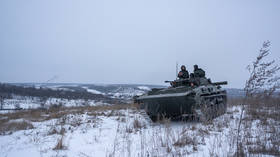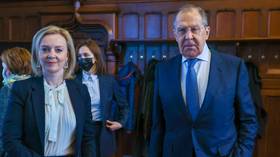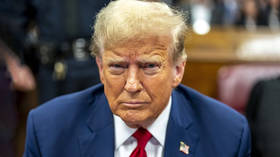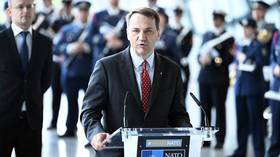Rational debate about Russia is unwelcome in the West
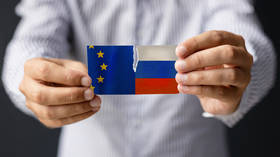
Western leaders are suffering from a relapse of ‘Russophobia’. European and American politicians have been promising us a Russian invasion of Ukraine any moment now for weeks, yet they have been unable to deliver on their promises.
God knows, they have tried – the media has been speculating on the ever-elusive invasion on a regular basis, adamantly declaring specific dates like a doomsday cult declaring the end of the world on a certain day (only to have to pick the next available date when Armageddon does not occur).
NATO countries, too, have done their best to provoke Russia into a war, sending troops to Eastern Europe in recent weeks as well as a range of weapons such as anti-tank missiles and Stinger anti-aircraft missiles. The US alone has given Ukraine $2.7 billion in military aid since 2014.
All this while Russia refuses to take the bait and has actually moved troops away from the Ukrainian border following the conclusion of planned military exercises.
Even Ukraine’s leadership has been reluctant to go along with the charade. The country’s president, Volodymyr Zelensky, downplayed the threat of a Russian invasion after discovering that the Western-generated propaganda was hitting his country where it hurts – in the economy. One of Zelensky’s senior parliamentary allies, David Arakhamia, noted that invasion talk is costing Ukraine’s economy around $2-$3 billion a month.
Since 2014, Ukraine’s so-called European Union and NATO allies have done significant damage to Ukraine’s economy, way of life, and international prestige in their willingness to sacrifice the country for their own agenda.
Still, there are those who will not stop trying to manufacture a crisis, knowing that once they provoke a war with Russia it will mean lots of money for the arms industry, and an EU unlikely to buy Russian gas, instead having to rely on US exports of Liquefied Natural Gas.
During this latest bout of Russophobic frenzy, there have been some individuals striving for peace and mutual prosperity between Russia and the West. They have proposed solutions to resolve the crisis, yet predictably faced censure for doing so.
Earlier this month, Finnish MP and chair of the country’s Foreign Affairs Committee Mika Niikko had to resign and apologize after tweeting a sensible suggestion that the crisis could be resolved if Western leaders took the initiative to promise Russia that “Ukraine will not join NATO” and asking “Doesn’t the West have a single wise head of state, who knows Russia?”
Last month, the head of the German navy, Kay-Achim Schönbach, stepped down after suggesting that Crimea would remain part of Russia and that it would be easy to give Russian President Vladimir Putin “… the respect he really demands – and probably also deserves.”
Just how far are European leaders willing to go to suppress any sensible ideas to de-escalate a crisis from which no winners could emerge?
In the US, former Democratic Party congresswoman Tulsi Gabbard pointed out that Ukraine’s membership of NATO, for which the Cold War legacy alliance is pushing, would undermine Russia’s national security by placing an adversary’s troops on its borders and “… points to one conclusion that I can see, which is, they actually want Russia to invade Ukraine” … as “number one, it gives the Biden administration a clear excuse to go and levy draconian sanctions, which are a modern day siege against Russia and the Russian people … And number two, it cements this Cold War in place. The military-industrial complex is the one that benefits from this.”
As a throwback to the days of an empire on which the sun supposedly never set, MP Tobias Ellwood, head of the British parliament’s defense committee, said the UK should take the global initiative and warn President Putin by calling for thousands of NATO troops to be deployed within Ukraine itself. But at least Mr Ellwood has enough common sense to realize that UK Foreign Secretary Liz Truss’ recent trip to Moscow had led to her, in his view, being “absolutely humiliated” and, coupled with Boris Johnson’s visit to Poland, was designed to distract from the ongoing Partygate scandal in London. The former soldier understands that a conflict between Russia and Ukraine – which could easily involve other nations – would have widespread consequences on food, grain, oil and gas prices and may even trigger another global recession.
To ensure he was not forgotten about, Labour Party leader Keir Starmer declared his unwavering support for NATO and accused the UK’s anti-war movement of siding with Russia. Unlike his Conservative counterpart, Mr Starmer cannot see that while tough talk may be cheap, an actual conflict would not be.
While all this is going on, the cost of living is rising in the UK at the fastest rate in 30 years, and it is seeing hikes in rent, energy, food, and fuel prices. Other countries around the world are witnessing a similar phenomenon.
Instead of deflecting attention from domestic problems, the leaders of the UK, US, and other NATO states ought to be focusing on helping their own citizens reach a decent standard of living and stop trying to fight Russia down to the last Ukrainian.
But this will only happen when our leaders learn to ‘love’ those who elected them more than they ‘hate’ Russia, and cease doing the bidding of the military-industrial-media complex.
The statements, views and opinions expressed in this column are solely those of the author and do not necessarily represent those of RT.

